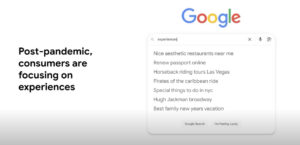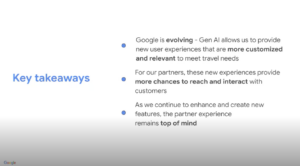On 6 May 2025, we had the pleasure of hosting a future-focused conversation with Google’s Lalit Gupta to explore the evolution of AI, search, and its transformational impact on the travel and hospitality industry.
As user behaviour shifts, technologies mature, and generative AI accelerates discovery, brands in travel and hospitality are grappling with both disruption and opportunity. In this 45-minute webinar, Lalit (who leads Travel Partnerships at Google) unpacked key changes in consumer expectations and search journeys, and how Google is using AI to deliver more intuitive, assistive experiences.
As a digital agency specialising in travel and hospitality, proud to work alongside some amazing clients in this space, we found this to be incredibly insightful (we actually predicted some of these transformational trends for 2025 in an article earlier this year).
Here are the top takeaways and strategic insights from the session, plus some practical guidance for marketers navigating this changing landscape.

One of the standout data points Lalit shared was that queries with more than six words are growing 50% faster than shorter queries. It’s a clear signal: search behaviour is getting more complex and more conversational.
And it’s not just length. Users are now combining multiple search intents into single, connected prompts – asking two or three questions in one go. For example, instead of searching “hotels in San Diego” and “does the hotel have a pool?”, users now search:
“Hotels in San Diego with adjoining rooms and a heated indoor pool.”
This has implications across organic and paid search:

Google’s mission hasn’t changed: “to organise the world’s information and make it universally accessible and useful.” But as Lalit explained, how this is achieved is being reinvented through AI.
Google’s rollout of AI-powered results, such as AI-organised result pages for dining, lodging and activities, is designed to help users reach decisions faster. These experiences go beyond summarising; they help cluster relevant, human-sourced content and offer pathways to explore further, from articles to forums to local businesses.
This is especially valuable in travel, where decisions are often high-consideration and emotionally charged.

From “nice aesthetic restaurants near me” to “horseback riding in Las Vegas,” Lalit shared that travel-related searches are increasingly experience-first and local-specific.
Google data shows that:
This creates a golden opportunity for emerging and independent travel and hospitality brands to compete on equal footing, if they can connect their value propositions to specific user needs.

AI is collapsing complexity at the surface, but beneath it, travel decisions remain intricate. Lalit cited that the average travel journey includes over 60 digital touchpoints – from search to social, content to comparison sites.
And increasingly, users want collaborative, resumable planning experiences:
This reflects a growing expectation for continuity across platforms, and a future where AI doesn’t just answer questions but orchestrates multi-channel discovery.
In a question about how brands can adapt to longer, connected search queries and stay discoverable with increasingly generative search experiences, Lalit emphasised a return to SEO fundamentals, but with an AI twist.
He explained that we must now consider:
For example, if a user searches for “Miami hotels with rooftop bars and family suites,” and your brand offers both, you need to have explicit content and markup that connects both features. That’s what makes your offer discoverable in AI-enhanced search environments.
It’s no longer about ranking for single keywords. It’s about creating pages and experiences that respond to specific combinations of intent.

We asked Lalit whether fully AI-native travel agents, platforms that handle discovery and booking, are around the corner.
His answer was balanced:
He quoted the old adage: “Trust, but verify.”
Users might trust AI to generate shortlists or ideas, but when it comes to booking their family holiday or honeymoon, they want to ensure it’s truly the right choice.
This suggests a future where AI helps plan and propose, but human touchpoints and trust mechanisms still play a critical role in the conversion funnel.
Lalit also shared updates on Google’s advertising innovations tailored to travel and hospitality, some of which we’re really excited about for our travel & hospitality clients:
Importantly, Google is also pushing a “Better Together” narrative – combining broad match keywords with smart bidding to address the 15% of daily search queries that have never been searched before.
For digital marketers, this means thinking beyond keywords and embracing dynamic, intent-led strategies powered by automation and AI signals.
The AI-Travel Future Is Already Here
From the explosion in long-tail, experiential search queries to the emergence of AI-curated journeys and new ad formats, it’s clear that we are in the middle of a transformation.
For travel and hospitality brands, the challenge is twofold:
And as Lalit reminded us, this isn’t just about technology – it’s about meeting evolving human needs with relevance, empathy, and creativity.

If you missed the webinar or want to revisit some of the insights, watch the recording here.
And, if you’re ready to explore how your travel brand can thrive in this new search landscape, get in touch with the Remarkable team. We’d love to help you plan your next move.
Remarkable are one of the world’s leading digital experience agencies. As a double Platinum Sitecore and Optimizely partner, we offer technology solutions to help brands build experiences that convert.